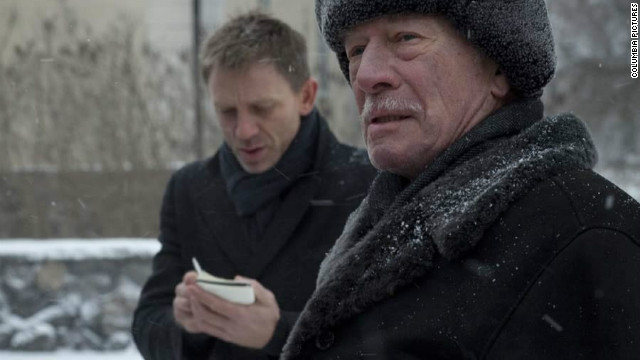

Director: David Fincher, 2011. (R)
Having watching the Swedish version that came out in 2009, and recently read all three of Stieg Larsson’s Millenium trilogy, I was ready to watch the English version of the first book, the mega-million seller. At the end of my review of the earlier film, I commented “hopefully that will leave more to the imagination than this one”. It does, but not by much.
The two main characters, left-wing investigative reporter Mikael Blomkvist and antisocial hacker Lisbeth Salander are played by Daniel Craig (the current James Bond) and Rooney Mara respectively. They anchor the film, while Christopher Plummer, the oldest Oscar-winner in history (picking up his best actor prize at age 82 in 2011 for Beginners), and Stellan Skarsgard offer strong performances as Henrik and Martin Vanger, the former and current CEO of the Vanger family business. And Robin Wright (The Princess Bride) plays Erika Berger, Blomkvist’s lover and co-founder of Millenium, the newspaper he runs and writes for.
 When Blomkvist is found guilty of libel he is offered a strange job by Henrik Vanger: to come to remote family island and write his biography. Really, he wants Blomkvist to find the killer of his niece. He believes it is one of his strange family members. The murder happened 40 years earlier and so the cold case needs magic to find a new approach. Blomkvist brings that magic and when he discovers a string of murders, he needs an assistant. Vanger’s lawyer suggests Salander, the woman who investigated him and found things even Blomkvist had forgotten. Together, they dig deep enough to become targets themselves.
When Blomkvist is found guilty of libel he is offered a strange job by Henrik Vanger: to come to remote family island and write his biography. Really, he wants Blomkvist to find the killer of his niece. He believes it is one of his strange family members. The murder happened 40 years earlier and so the cold case needs magic to find a new approach. Blomkvist brings that magic and when he discovers a string of murders, he needs an assistant. Vanger’s lawyer suggests Salander, the woman who investigated him and found things even Blomkvist had forgotten. Together, they dig deep enough to become targets themselves.Salander is an interesting character. Tatted out and wearing rings in any place possible, she exudes sociopath. She seems to be dumb and crazy. Crazy she might be, but dumb she is not. She is antagonistic towards authority, and leans both ways sexually. Little of her backstory is told, but we do find out more about her guardianship. Institutionalized at 13, she is now a ward of the state. When her newest guardian sexually assaults her and then later ties, rapes and tortures her, we understand something of her hatred.
 Fincher’s version plays closer to the source material. We do see more of Salander’s past including her former guardian, the one she is close to. But he also conflates some material from the second book to explain more of her teenage problems. Berger is more of a character here, and that is important as she becomes more prominent in the subsequent two books.
Fincher’s version plays closer to the source material. We do see more of Salander’s past including her former guardian, the one she is close to. But he also conflates some material from the second book to explain more of her teenage problems. Berger is more of a character here, and that is important as she becomes more prominent in the subsequent two books. Yet, it feels like he left a lot out. The story, long at 158 minutes, seems to fly by leaving much of depth of the book out. However, where the Swedish version ends at the solving of the murder mystery, this version continues with the book to bring closure to the subplot of Blomkvist’s libel.
Like the earlier version, there is much violence, too much so. The rape scene is a little more restrained yet still feels gratuitous. Watching it made me feel dirty, as though I was there and let it happen.
 I have explored the key themes of the film in my earlier film response, and I won’t repeat in detail my comments. As with that film, depravity is on display dead-center. Not only does it come across in the rape of Salander, but also in the torture of the female victims and the misanthropic dealings of the Venger family. And there are ethical considerations behind hacking.
I have explored the key themes of the film in my earlier film response, and I won’t repeat in detail my comments. As with that film, depravity is on display dead-center. Not only does it come across in the rape of Salander, but also in the torture of the female victims and the misanthropic dealings of the Venger family. And there are ethical considerations behind hacking.All in all, I found this version a little less grisly and a little more complete than the Swedish version. Best of all, though, was the book. It’s a long book but certainly a good read, if you can stomach this kind of mystery.
Copyright©2012, Martin Baggs

No comments:
Post a Comment